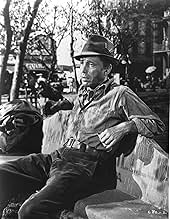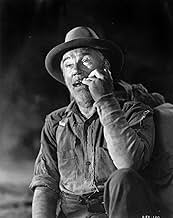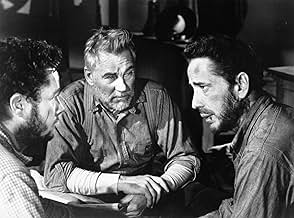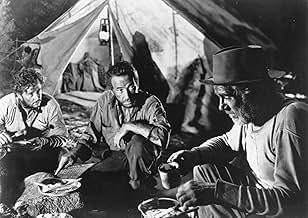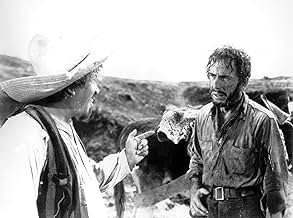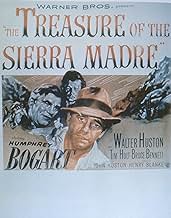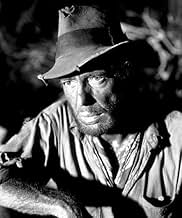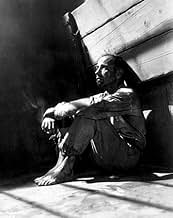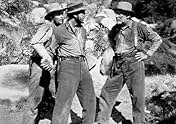Dos norteamericanos en México convencen a un hombre para que los ayude a extraer oro en las montañas de Sierra Madre.Dos norteamericanos en México convencen a un hombre para que los ayude a extraer oro en las montañas de Sierra Madre.Dos norteamericanos en México convencen a un hombre para que los ayude a extraer oro en las montañas de Sierra Madre.
- Dirección
- Guionistas
- Elenco
- Ganó 3 premios Óscar
- 18 premios ganados y 5 nominaciones en total
Barton MacLane
- Pat McCormick
- (as Barton Mac Lane)
Arturo Soto Rangel
- Presidente
- (as A. Soto Rangel)
Manuel Dondé
- El Jefe
- (as Manuel Donde)
José Torvay
- Pablo
- (as Jose Torvay)
Robert Blake
- Mexican Boy Selling Lottery Tickets
- (sin créditos)
Guillermo Calles
- Mexican Storeowner
- (sin créditos)
Roberto Cañedo
- Mexican Lieutenant
- (sin créditos)
Spencer Chan
- Proprietor
- (sin créditos)
Jacqueline Dalya
- Flashy Girl
- (sin créditos)
Ralph Dunn
- Flophouse Bum
- (sin créditos)
Ernesto Escoto
- Mexican Bandit
- (sin créditos)
- Dirección
- Guionistas
- Todo el elenco y el equipo
- Producción, taquilla y más en IMDbPro
Resumen
Reviewers say 'The Treasure of the Sierra Madre' is a critically acclaimed classic, lauded for its profound examination of greed, betrayal, and human nature. John Huston's direction and screenplay, alongside exceptional performances by Humphrey Bogart, Walter Huston, and Tim Holt, are often celebrated. The film's authentic atmosphere, intricate character studies, and moral complexities deeply resonate. Although some critique its pacing and subplots, most regard it as a timeless masterpiece noted for its psychological depth and thematic richness.
Opiniones destacadas
This film is a sharp-edged study of the effects of greed on otherwise normal men, and one man in particular: Bogart's Fred C. Dobbs. Dobbs and Bob Curtin (Tim Holt) are down and out and meet up with prospector Howard (Walter Huston). When Dobbs wins a lottery, he uses the proceeds to finance a trip for the three to central Mexico to search for gold.
The three have to deal with the lawlessness of central Mexico at the time - bandits were actually on the loose in that country killing anybody with stuff, and taking that stuff. The Federales were a violent solution to a violent problem - killing the bandits after a summary judgement and the bandits having dug their own graves. So our trio not only have to worry about bandits once they strike gold, they have to worry about the darkness of their own souls.
In the beginning, Bogart's Fred C. Dobbs is a decent guy who does not take advantage of others. Dobbs only takes his money from the guy that wouldn't pay and he does share his lottery ticket and is generous with his fellow miners, but as greed begins to take root in him, little by little we see his goodness eaten away. It's a great credit to the writing and Bogart's skills that this is done gradually and played out over time. Incidentally, that's director John Huston "staking him to a meal". One of the best director cameos ever (although Polanski in Chinatown is equally great)!
Dobbs overestimates himself and the fallibility of human nature. Walter Hustons character freely admits what gold could do to any of them including himself. Dobbs is sure it will never happen to him, but he's never had anything, so he's never faced temptation, and when he falls it's a long way down.
This may be Tim Holt's finest performance - it was probably his finest opportunity given he had spent years laboring as a B western star on the RKO lot. Walter Huston as the prospector, minus his dentures and plus a bunch of pounds and with holes in his clothes is not the debonair fellow you are used to seeing in film . If Mary Astor's character in Dodsworth could have thought this was the future appearance of the man she loved, would she have taken her gondola in the other direction? I guess we'll never know.
Highly recommended as one of the great character studies in which several characters get studied in detail.
The three have to deal with the lawlessness of central Mexico at the time - bandits were actually on the loose in that country killing anybody with stuff, and taking that stuff. The Federales were a violent solution to a violent problem - killing the bandits after a summary judgement and the bandits having dug their own graves. So our trio not only have to worry about bandits once they strike gold, they have to worry about the darkness of their own souls.
In the beginning, Bogart's Fred C. Dobbs is a decent guy who does not take advantage of others. Dobbs only takes his money from the guy that wouldn't pay and he does share his lottery ticket and is generous with his fellow miners, but as greed begins to take root in him, little by little we see his goodness eaten away. It's a great credit to the writing and Bogart's skills that this is done gradually and played out over time. Incidentally, that's director John Huston "staking him to a meal". One of the best director cameos ever (although Polanski in Chinatown is equally great)!
Dobbs overestimates himself and the fallibility of human nature. Walter Hustons character freely admits what gold could do to any of them including himself. Dobbs is sure it will never happen to him, but he's never had anything, so he's never faced temptation, and when he falls it's a long way down.
This may be Tim Holt's finest performance - it was probably his finest opportunity given he had spent years laboring as a B western star on the RKO lot. Walter Huston as the prospector, minus his dentures and plus a bunch of pounds and with holes in his clothes is not the debonair fellow you are used to seeing in film . If Mary Astor's character in Dodsworth could have thought this was the future appearance of the man she loved, would she have taken her gondola in the other direction? I guess we'll never know.
Highly recommended as one of the great character studies in which several characters get studied in detail.
Two penniless Americans (Humphrey Bogart and Tim Holt) during the 1920s in Mexico join with an old-timer (Walter Huston, the director's father) to prospect for gold. The old-timer accurately predicts trouble, but is willing to go anyway. The film is fictional, but presents a very realistic scenario: By the 1920s the violence of the Mexican Revolution had largely subsided, although scattered gangs of bandits continued to terrorize the countryside. The newly established post-revolution government relied on the effective, but ruthless, Federal Police, commonly known as the Federales, to patrol remote areas and dispose of the bandits. Foreigners, like the three American prospectors, were at very real risk of being killed by the bandits if their paths crossed. The bandits, likewise, were given little more than a "last cigarette" by the army units after capture, even having to dig their own graves first.
The film shows the Americans doing just about anything for money: drilling oil, digging for gold, begging and more. And once gold comes into the picture, the men who once claimed they were not greedy see things differently. Bogart actually goes mad, after he gets greedy and paranoid... during which he encounters a gila monster! The most memorable scene of this film involves the bandits, who don't need any "stinking badges". While the line is much more quotable in "Blazing Saddles", we couldn't have "Blazing Saddles" (or "UHF") without this film... just about everyone, even those who never saw or heard of "Sierra Madre", knows the badges line.
Humphrey Bogart's best film is probably "Casablanca", but this one features him in a nice, rough exterior. Yes, sometimes leading men have beards and are covered in dirt. Pretty boys do not stay pretty boys after digging in the hills, or at least that wouldn't be realistic. This film does a fine job trying to "keep it real", so we have to commend Huston not only on his directing, but his wonderful location scouting.
The film shows the Americans doing just about anything for money: drilling oil, digging for gold, begging and more. And once gold comes into the picture, the men who once claimed they were not greedy see things differently. Bogart actually goes mad, after he gets greedy and paranoid... during which he encounters a gila monster! The most memorable scene of this film involves the bandits, who don't need any "stinking badges". While the line is much more quotable in "Blazing Saddles", we couldn't have "Blazing Saddles" (or "UHF") without this film... just about everyone, even those who never saw or heard of "Sierra Madre", knows the badges line.
Humphrey Bogart's best film is probably "Casablanca", but this one features him in a nice, rough exterior. Yes, sometimes leading men have beards and are covered in dirt. Pretty boys do not stay pretty boys after digging in the hills, or at least that wouldn't be realistic. This film does a fine job trying to "keep it real", so we have to commend Huston not only on his directing, but his wonderful location scouting.
Magnificent rendition of B. Traven's story of ambition and human nature at its worst and dealing with an unlikely trio of ambitious prospectors . As Fred Dobbs (Humphrey Bogart) and Bob Curtin (Tim Holt) , two Americans searching for work in Mexico, convince an old prospector (Walter Huston) to help them mine for gold in the Sierra Madre Mountains . Through a lot of troubles they eventually succeed in finding gold, but greedy outlaws (Alfonso Bedoya) , and most especially craziness lead to disaster . As they sold their souls for the treasure of the Sierra Madre .
It's an intelligent semi-western that scrutinizes the greed and paranoia that afflicts a misfit group , including their enormous difficulties and breathtaking taking on between protagonists and the Mexican enemies that stalk to them . The film blends thrills , emotion , intrigue , high body-count and it's fast moving and exciting ; being filmed in Mexico, though Warners' studio head Jack L. Warner had the unit return to Hollywood when the budget started to exceed $3 million . Thought-provoking screenplay by the same Huston , concerning about greed and ambition that threaten to turn their success into disaster . Director John Huston had read the book by B. Traven in 1936 and had always thought the material would make a great movie . Based on a 19th-century ballad by a German poet , Traven's book reminded Huston of his own adventures in the Mexican cavalry . When Huston became a director at Warner Bros. , the smashing success of his initial effort, The Maltese Falcon (1941), gave him the clout to ask to write and direct the project, for which Warner Bros had previously secured the movie rights . Although by many to be director John Huston's finest film , this is a tale of fear , greed and murder , as three partners fall out over the gold they have clawed out of the inhospitable and bandit-ridden deserts and mountains . It also has probably the most brutal gold bar fight ever put on film along with "The Ruthless Four" . Overrated by some reviewers , but very interesting and attractive to watch . It above all things mostly also remains a real characters movie, in which the three main roles are the essentials . Their dynamic together is also great and is what mostly keeps this movie going . They are three totally different characters, which is the foremost reason why they work out so great together on film . Bogart is superbly believable and gives a nice portrait of an increasingly unhinged prospector , Walter Huston is very good as a cunning veteran and Tim Holt is also pretty well . John Huston has a cameo as an American tourist , this scene was directed by Humphrey Bogart, who took malicious pleasure on his director by making him perform the scene over and over again. And the little boy who sells Bogart the portion of the winning lottery ticket is Robert Blake . The bum seated near Walter Huston in the first scene in the Oso Negro flophouse is Jack Holt, father of Tim Holt . Walter Huston, father of director John Huston, won the Academy Award for best supporting actor , John won for best direction . This was the first father/son win .
The musician Max Steiner composes a vibrant soundtrack and well conducted ; including a catching leitmotif and considered to be one of the best . Atmospheric scenario with barren outdoors , dirty landscapes under sunny exteriors and a glimmer sun and fine sets with striking cinematography by Ted McCord , this was one of the first American films to be made almost entirely on location outside the USA . Also shown in computer-colored version . The picture was shot on location in Tampico, Mexico ; just as John Huston was starting to shoot scenes in, the production was shut down inexplicably by the local government ; it turns out that a local newspaper printed a false story that accused the filmmakers of making a production that was unflattering to Mexico . Fortunately, two of Huston's associates, Diego Rivera and Miguel Covarrubias, went to bat for the director with the President of Mexico , then the libelous accusations were dropped . The motion picture was stunningly realized by John Huston and the film took 5-1/2 months to shoot and was 29 days over schedule ; Robert Rossen submitted at least nine drafts of rewrites on the screenplay when John Huston was away during the war . Rating : Above average . Well worth watching , essential and indispensable seeing . In 2007: The American Film Institute ranked this as the #38 Greatest Movie of All Time.
It's an intelligent semi-western that scrutinizes the greed and paranoia that afflicts a misfit group , including their enormous difficulties and breathtaking taking on between protagonists and the Mexican enemies that stalk to them . The film blends thrills , emotion , intrigue , high body-count and it's fast moving and exciting ; being filmed in Mexico, though Warners' studio head Jack L. Warner had the unit return to Hollywood when the budget started to exceed $3 million . Thought-provoking screenplay by the same Huston , concerning about greed and ambition that threaten to turn their success into disaster . Director John Huston had read the book by B. Traven in 1936 and had always thought the material would make a great movie . Based on a 19th-century ballad by a German poet , Traven's book reminded Huston of his own adventures in the Mexican cavalry . When Huston became a director at Warner Bros. , the smashing success of his initial effort, The Maltese Falcon (1941), gave him the clout to ask to write and direct the project, for which Warner Bros had previously secured the movie rights . Although by many to be director John Huston's finest film , this is a tale of fear , greed and murder , as three partners fall out over the gold they have clawed out of the inhospitable and bandit-ridden deserts and mountains . It also has probably the most brutal gold bar fight ever put on film along with "The Ruthless Four" . Overrated by some reviewers , but very interesting and attractive to watch . It above all things mostly also remains a real characters movie, in which the three main roles are the essentials . Their dynamic together is also great and is what mostly keeps this movie going . They are three totally different characters, which is the foremost reason why they work out so great together on film . Bogart is superbly believable and gives a nice portrait of an increasingly unhinged prospector , Walter Huston is very good as a cunning veteran and Tim Holt is also pretty well . John Huston has a cameo as an American tourist , this scene was directed by Humphrey Bogart, who took malicious pleasure on his director by making him perform the scene over and over again. And the little boy who sells Bogart the portion of the winning lottery ticket is Robert Blake . The bum seated near Walter Huston in the first scene in the Oso Negro flophouse is Jack Holt, father of Tim Holt . Walter Huston, father of director John Huston, won the Academy Award for best supporting actor , John won for best direction . This was the first father/son win .
The musician Max Steiner composes a vibrant soundtrack and well conducted ; including a catching leitmotif and considered to be one of the best . Atmospheric scenario with barren outdoors , dirty landscapes under sunny exteriors and a glimmer sun and fine sets with striking cinematography by Ted McCord , this was one of the first American films to be made almost entirely on location outside the USA . Also shown in computer-colored version . The picture was shot on location in Tampico, Mexico ; just as John Huston was starting to shoot scenes in, the production was shut down inexplicably by the local government ; it turns out that a local newspaper printed a false story that accused the filmmakers of making a production that was unflattering to Mexico . Fortunately, two of Huston's associates, Diego Rivera and Miguel Covarrubias, went to bat for the director with the President of Mexico , then the libelous accusations were dropped . The motion picture was stunningly realized by John Huston and the film took 5-1/2 months to shoot and was 29 days over schedule ; Robert Rossen submitted at least nine drafts of rewrites on the screenplay when John Huston was away during the war . Rating : Above average . Well worth watching , essential and indispensable seeing . In 2007: The American Film Institute ranked this as the #38 Greatest Movie of All Time.
Having had his day as an idolized star and romantic leading man, it was now time for Bogart to get down to the serious business of acting
For eighteen years it had usually been Bogart playing Bogart in various shadings
Now that Bogart was gone and in his place was an older and far less romantic figure, one who found new challenges and was able to meet most of them successfully
This new phase of his continued growth began with a story of three men in search of gold
Although "The Treasure of the Sierra Madre" is indisputably one of Bogart's best films, it was co-star Walter Huston who won an Academy Award as did the movie's director and scenarist, John Huston
Based on a novel by the mysterious B. Traven, the film told a riveting tale which explored the degenerative effects of encroaching greed, distrust, and hatred on three prospectors who team up to search for gold in Mexico
Bogart's Fred C. Dobbs was an amazingly complex creation whose slow disintegration into paranoia was brilliant1y managed on camera He is a born loser with no potential for change in sight Suspicious, unfeeling, savage, and easily corruptible, he seems clearly destined for a tragic fate almost from our first meeting with him
Tim Holt was also excellent as Bob Curtin, a man who, like Bogart, is tempted but whose conscience will not permit him to exercise his baser desires. (He could have let Bogart die in a cave-in, but saved him instead.) Young, impressionable, and unprepared, he has never seen the likes of a Fred C. Dobbs and he finds himself overwhelmed and uncertain as to how he will cope with Dobbs's rage and greed
However, it is the director's father, Walter Huston, who literally stole the picture from both Bogart and Holt as he played Howard, a wise old toothless codger who knew all along what would happen and took it all in stride, kicking up his heels and having a marvelous time Life can't surprise him any more He's already had successes and failures enough for one lifetime Like a faithful dog, he's along for the thrill of the hunt, and should there be another pot of gold at the end of this rainbow, well, that's just a bonus
It is mainly the interaction of these three men from their first meeting and uneasy partnership through their final confrontation that made "The Treasure of the Sierra Madre" one of Warner Brothers' triumphs of the forties
Although "The Treasure of the Sierra Madre" is indisputably one of Bogart's best films, it was co-star Walter Huston who won an Academy Award as did the movie's director and scenarist, John Huston
Based on a novel by the mysterious B. Traven, the film told a riveting tale which explored the degenerative effects of encroaching greed, distrust, and hatred on three prospectors who team up to search for gold in Mexico
Bogart's Fred C. Dobbs was an amazingly complex creation whose slow disintegration into paranoia was brilliant1y managed on camera He is a born loser with no potential for change in sight Suspicious, unfeeling, savage, and easily corruptible, he seems clearly destined for a tragic fate almost from our first meeting with him
Tim Holt was also excellent as Bob Curtin, a man who, like Bogart, is tempted but whose conscience will not permit him to exercise his baser desires. (He could have let Bogart die in a cave-in, but saved him instead.) Young, impressionable, and unprepared, he has never seen the likes of a Fred C. Dobbs and he finds himself overwhelmed and uncertain as to how he will cope with Dobbs's rage and greed
However, it is the director's father, Walter Huston, who literally stole the picture from both Bogart and Holt as he played Howard, a wise old toothless codger who knew all along what would happen and took it all in stride, kicking up his heels and having a marvelous time Life can't surprise him any more He's already had successes and failures enough for one lifetime Like a faithful dog, he's along for the thrill of the hunt, and should there be another pot of gold at the end of this rainbow, well, that's just a bonus
It is mainly the interaction of these three men from their first meeting and uneasy partnership through their final confrontation that made "The Treasure of the Sierra Madre" one of Warner Brothers' triumphs of the forties
Tampico sets the scene for the start of speculation, Fred C. Dobbs is out of cash and his luck is in cessation, but an encounter in flophouse, and big dreams emerge and arouse, as a plan is born with Howard, and a fellow who's called Curtin. Into hills laden with gold, our companions then embark, finding seams that come alive with golden riches to impart, building up substantial fortune, thinking soon they will be tycoons, but there's one who's trust is waning and has sores that start to smart. The journey back becomes a challenge to them all, as one by one the group is scattered, battered, stalled, will their work be well rewarded, will endeavours all be thwarted, either way, you will be engaged, and quite possibly enthralled.
Bogarts best performance.
Bogarts best performance.
¿Sabías que…?
- TriviaJohn Huston stated that working with his father on this picture and his dad's subsequent Oscar win were among the favorite moments of his life.
- ErroresAlthough set in the 1920s, many of the cars on the streets of Tampico are of 1930s and 1940s vintage; likewise, women, when prominently seen, are groomed and dressed strictly in the style of the 1940s.
- ConexionesFeatured in The Screen Writer (1950)
- Bandas sonorasBelieve Me If All Those Endearing Young Charms
(1808) (uncredited)
Music traditional
Played on harmonica by Walter Huston
Selecciones populares
Inicia sesión para calificar y agrega a la lista de videos para obtener recomendaciones personalizadas
Detalles
- Fecha de lanzamiento
- País de origen
- Idiomas
- También se conoce como
- The Treasure of the Sierra Madre
- Locaciones de filmación
- Kernville, California, Estados Unidos(Kelly's Rainbow Mine)
- Productora
- Ver más créditos de la compañía en IMDbPro
Taquilla
- Presupuesto
- USD 3,000,000 (estimado)
- Total en EE. UU. y Canadá
- USD 5,014,000
- Fin de semana de estreno en EE. UU. y Canadá
- USD 144,074
- 14 ene 2018
- Total a nivel mundial
- USD 5,014,000
- Tiempo de ejecución2 horas 6 minutos
- Color
- Relación de aspecto
- 1.37 : 1
Contribuir a esta página
Sugiere una edición o agrega el contenido que falta

Principales brechas de datos
What was the official certification given to El tesoro de la Sierra Madre (1948) in Japan?
Responda

